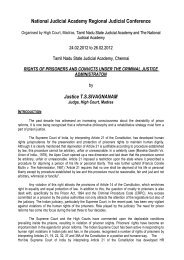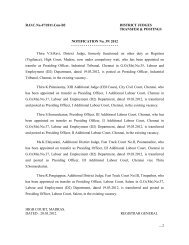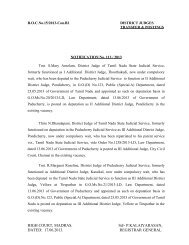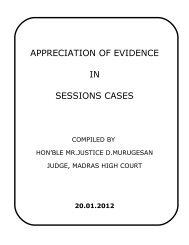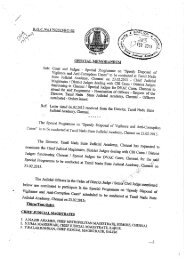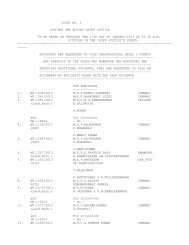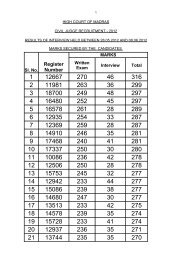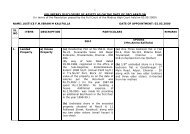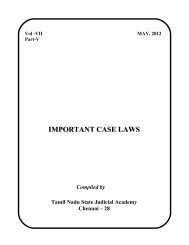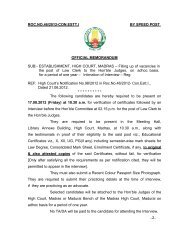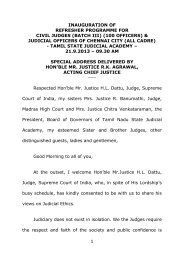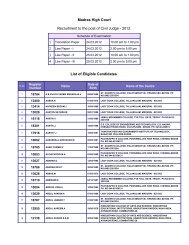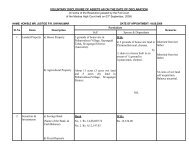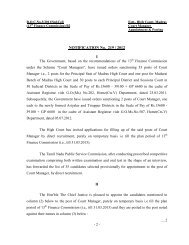IMPORTANT CASE LAWS - Madras High Court
IMPORTANT CASE LAWS - Madras High Court
IMPORTANT CASE LAWS - Madras High Court
Create successful ePaper yourself
Turn your PDF publications into a flip-book with our unique Google optimized e-Paper software.
Civil Procedure Code, 1908 – Or. 9 R. 13 – Ex parte decree – Setting aside of – “Sufficient cause” – Meaning<br />
and test for – Held, test to be applied is whether defendant honestly and sincerely intended to remain present when<br />
the suit was called on for hearing and did his best to do so – It is such cause for which defendant could not be<br />
blamed for his absence – “Sufficient cause” is a question of fact – Words and Phrases – “Sufficient cause”, “Good<br />
cause”.<br />
Held:<br />
The meaning of the word “sufficient” is “adequate” or “enough”, inasmuch as may be necessary to answer<br />
the purpose intended. In this context, “sufficient cause” means that the party had not acted in a negligent manner<br />
or there was a want of bona fide on its part in view of the facts and circumstances of a case or the party cannot be<br />
alleged to have been “not acting diligently” or “remaining inactive”.<br />
Evidence Act, 1872 – Ss. 114 III. (f), 16 and 101 & 103 – Burden of proof – Provision placing burden on party<br />
asserting particular fact – Presumption of service by registered post under S. 114 III. (f) – Reiterated, burden to<br />
rebut said presumption is on party challenging factum of service – General Clauses Act, 1897, S. 27.<br />
Civil Procedure Code, 19078 – Or. 41 Rr. 31 & 33 and S. 96 – First appeal – Powers of court disposing of<br />
such appeal – Proper exercise of – Held, first appellate court should not disturb and interfere with valuable rights of<br />
parties which stand crystallized by trial court’s judgment, without opening whole case for rehearing, both on<br />
question of facts and law.<br />
2011 (4) SCALE 656<br />
Deb Ratan Biswas and Ors<br />
vs<br />
Most. And Moyi Devi & Ors<br />
CIVIL PROCEDURE – C.P.C. – SECTION 115 & 151 – CONTRACT ACT, 1872 – SECTION 207 – Power of<br />
attorney – Revocation of – Principal is not bound to consult his attorney before signing a compromise petition –<br />
Even after execution of power of attorney the principal can act independently and does not have to take consent of<br />
the attorney – Appellants filed a suit for partition against respondents – While partition suit was pending,<br />
defendants respondents executed a General Power of Attorney on 31.7.1992 – On 30.7.1196, parties to the suit<br />
including defendants respondents filed a compromise petition – Trial <strong>Court</strong> approved terms of the compromise and<br />
directed that a decree be passed in terms of the compromise – Subsequently, a petition purporting to be on behalf<br />
of defendants filed through the attorney u/s 151, CPC praying for recalling the order passed in terms of the<br />
compromise on allegation that the signatures on the compromise were forged – Trial <strong>Court</strong> dismissed the petition<br />
holding that there was not forgery – Civil consulted their attorney before signing the compromise petition and that<br />
attorney’s unwillingness should have been mentioned in the compromise petition – Whether the <strong>High</strong> <strong>Court</strong> was<br />
empowered to interfere with finding of fact recorded by the trial <strong>Court</strong> – Held, No – Whether principal was bound to<br />
consult his attorney before signing a compromise petition – Held, No – Allowing the appeal, Held,<br />
The principal Pushpa Biswas and Apurva Kumar Biswas have signed the compromise for partition of the property,<br />
which in our opinion in law amounts to implied revocation of power of attorney in favour of Dr. Sanjeev Kumar Mishra vide<br />
illustration of Section 207 of the India Contract Act. Pushpa Biswas and Apurva Kumar Biswas cannot be allowed to say<br />
that their own act of signing the compromise petition was collusive and fraudulent.<br />
The learned Subordinate Judge-V, Bhagalpur has gone into the evidence in great detail and recorded findings of<br />
fact which could not have been interfered with by the <strong>High</strong> <strong>Court</strong> in civil revision. It is well settled that in civil revision the<br />
jurisdiction of the <strong>High</strong> <strong>Court</strong> is limited, and it can only go into the questions of jurisdiction, but there is no error of jurisdiction<br />
in the present case.<br />
5



